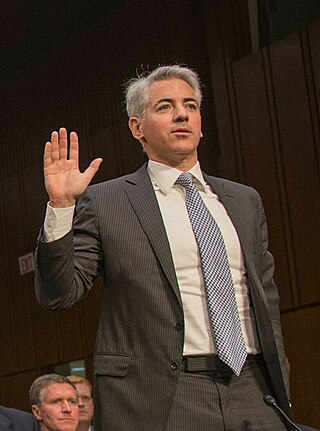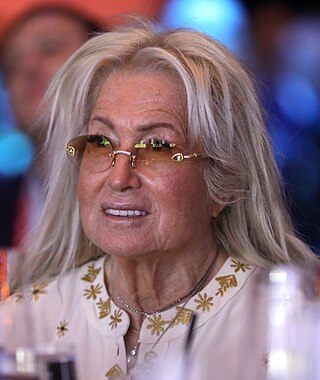Related Research Articles

Robert Kenneth Kraft is an American billionaire businessman. He is the chairman and chief executive officer (CEO) of the Kraft Group, a diversified holding company with assets in paper and packaging, sports and entertainment, real estate development, and a private equity portfolio. Since 1994, Kraft has owned the New England Patriots of the National Football League (NFL). He also owns the New England Revolution of Major League Soccer (MLS), which he founded in 1996, and the esport-based Boston Uprising, which Kraft founded in 2017. As of July 2024, he has an estimated net worth of US$11.1 billion according to Forbes.

Craig Alexander Newmark is an American internet entrepreneur and philanthropist best known as the founder of the classifieds website Craigslist. Prior to founding Craigslist, he worked as a computer programmer for IBM, Bank of America, and Charles Schwab. Newmark served as chief executive officer of Craigslist from its founding until 2000. He founded Craig Newmark Philanthropies in 2015.

Kenneth Cordele Griffin is an American hedge fund manager, entrepreneur and investor. He is the founder, chief executive officer, co-chief investment officer, and 80% owner of Citadel LLC, a multinational hedge fund. He also owns Citadel Securities, one of the largest market makers in the United States.

Pindaros Roy Vagelos is an American physician and business executive, who was president and chief executive officer (1985) and chairman (1986) of the American pharmaceutical company Merck & Co..

Sir Leonard Valentinovich Blavatnik is a Soviet/Ukrainian-born British-American businessman and philanthropist. In 2024, Forbes estimated his net worth at $32.1 billion, ranking him the 52nd-richest person in the world. In 2017, Blavatnik received a knighthood for services to philanthropy.
Antisemitism at universities has been reported and supported since the medieval period and, more recently, resisted and studied. Antisemitism has been manifested in various policies and practices, such as restricting the admission of Jewish students by a Jewish quota, or ostracism, intimidation, or violence against Jewish students, as well as in the hiring, retention and treatment of Jewish faculty and staff. In some instances, universities have been accused of condoning the development of antisemitic cultures on campus.

William Albert Ackman is an American billionaire hedge fund manager who is the founder and chief executive officer of Pershing Square Capital Management, a hedge fund management company. His investment approach has made him an activist investor. As of June 2024, Ackman's net worth was estimated at $9.3 billion by Forbes.

Derek Jonathan Penslar, is an American-Canadian comparative historian with interests in the relationship between modern Israel and diaspora Jewish societies, global nationalist movements, European colonialism, and post-colonial states.

Mary Elizabeth Magill is an American legal scholar and academic administrator. She served as the 9th president of the University of Pennsylvania from 2022 to 2023, executive vice president and provost of the University of Virginia from 2019 to 2022, and dean of Stanford Law School from 2012 to 2019.

Barry Stuart Sternlicht is an American billionaire and the co-founder, chairman, and CEO of Starwood Capital Group, an investment fund with over $100 billion in assets under management. He is also chairman of Starwood Property Trust. He is the founder of Starwood Hotels and Resorts Worldwide and served as its Chairman and CEO from 1995 to 2005. As of May 2023, his net worth was estimated at $4.6 billion.
Leon G. Cooperman is an American billionaire investor and hedge fund manager. He is the chairman and CEO of Omega Advisors, a New York-based investment advisory firm managing over $3.3 billion in assets under management, the majority consisting of his personal wealth.

Miriam Adelson is an Israeli-American physician, businesswoman, and political donor.
Jonathan D. Gray is an American billionaire businessman who is the president and chief operating officer of Blackstone Group, a New York–based asset management firm. He is also the chairman of Hilton Worldwide.
Marc Jeffrey Rowan is an American investor. He co-founded Apollo Global Management in 1990 with Josh Harris and Leon Black and took over as CEO in 2021. As of April 2024, Forbes estimated his wealth at $6.5 billion.

Students for Justice in Palestine is a pro-Palestinian college student activism organization in the United States, Canada and New Zealand. Founded at the University of California in 2001, it has campaigned for boycott and divestment against corporations that deal with Israel and organized events about Israel's human rights violations. In 2011, The New York Times called it "the leading pro-Palestinian voice on campus". As of 2024, National SJP has over 350 chapters in North America.

IfNotNow is an American Jewish group which opposes the Israeli occupation of the West Bank and Gaza Strip. Its membership demonstrates against politicians, United States policies, and institutions it perceives as supporting occupation, usually seeking to apply pressure through direct action and media appearances. It has been characterized variously as progressive or far-left.

Claudine Gay is an American political scientist and academic administrator who is the Wilbur A. Cowett Professor of Government and of African and African-American Studies at Harvard University. Gay's research addresses American political behavior, including voter turnout and politics of race and identity.

On December 5, 2023, the United States House Committee on Education & the Workforce held a hearing on antisemitism on college campuses. The committee called a few university leaders to testify, including the presidents of Harvard University, the University of Pennsylvania, and the Massachusetts Institute of Technology.
Jews have faced antisemitism and discrimination in universities and campuses in the United States, from the founding of universities in the Thirteen Colonies until the present day in varying intensities. From the early 20th century, and until the 1960s, indirect quotas were placed on Jewish admissions, quotas were first placed on Jews by elite universities such Columbia, Harvard and Yale and were prevalent as late as the 1960s in universities such as Stanford. These quotas disappeared in the 1970s.

Antisemitism at Columbia University was prevalent in the first half of the 20th century and has resurged in recent years. In the early 21st century, discourse surrounding the Israeli–Palestinian conflict would sometimes lead to accusations of antisemitism, but these individual controversies were typically isolated.
References
- 1 2 3 4 5 6 Meyersohn, Nathaniel (2023-10-19). "Harvard and UPenn donors are furious. It may have a financial domino effect". CNN . Retrieved 29 April 2024.
- 1 2 "Harvard's Gift Officers Are Worried About Backlash Over the School's Israel-Hamas Response. Here's Why". Harvard Crimson . 2023-11-29. Retrieved 1 May 2024.
- 1 2 3 4 "Wall Street titans help fuel Ivy League donor revolt". CNBC . 2023-11-02. Retrieved 29 April 2024.
- 1 2 "Columbia Giving Day donations down significantly amid donor crisis". Columbia Daily Spectator . 2024-10-03. Retrieved 20 October 2024.
- 1 2 3 Blinder, Alan (2024-05-10). "For Columbia and a Powerful Donor, Months of Talks and Millions at Risk". New York Times . Retrieved 20 October 2024.
- 1 2 "Robert Kraft, CC '63, trustee emeritus, announces he is 'not comfortable' supporting Columbia until protests end". Columbia Daily Spectator . 2024-04-22. Retrieved 20 October 2024.
- 1 2 Andersen, Travis (2023-10-13). "Philanthropist couple leaving Harvard Kennedy School board over university's response to Hamas attack". Boston Globe . Archived from the original on 2023-10-13. Retrieved 29 April 2024.
- ↑ "Wexner Foundation cuts ties with Harvard after Israeli billionaire Ofer quits board". CTech . 2023-10-16. Retrieved 29 April 2024.
- ↑ Berg, Madeline (2023-10-12). "Apollo CEO is calling for University of Pennsylvania leaders to resign after he says they refused to strongly condemn antisemitism". Business Insider . Retrieved 29 April 2024.
- 1 2 Mitovich, Jared (2023-10-15). "Huntsman family, longtime Penn supporters, will halt donations to 'unrecognizable' University". Daily Pennsylvanian . Retrieved 29 April 2024.
- 1 2 Fiske, Gavriel (2024-10-21). "Spurning alma mater UPenn over response to antisemitism, benefactor pivots to Israel". Times of Israel . Retrieved 20 October 2024.
- ↑ Kim, Chloe (2023-12-08). "Elizabeth Magill: UPenn loses $100m donation after House antisemitism testimony". BBC . Retrieved 21 October 2024.
- ↑ Dorn, Andrew (2024-10-19). "Harvard donations drop; alums cut ties over anti-Israel protests". The Hill . Retrieved 21 October 2024.
- ↑ "Penn Fund donations down 21% from this time last year amid leadership crisis, donor backlash". Daily Pennsylvanian . 2024-04-10. Retrieved 20 October 2024.
- ↑ Cohen, Haley (2024-06-25). "After cutting ties with his alma mater Columbia, Kraft gives $1 million to Yeshiva University". EJewish Philanthropy . Retrieved 21 October 2024.
- ↑ Smith, Patrick (2024-06-04). "Mystery Columbia alum donates $260 million to Israeli college". NBC News . Retrieved 21 October 2024.